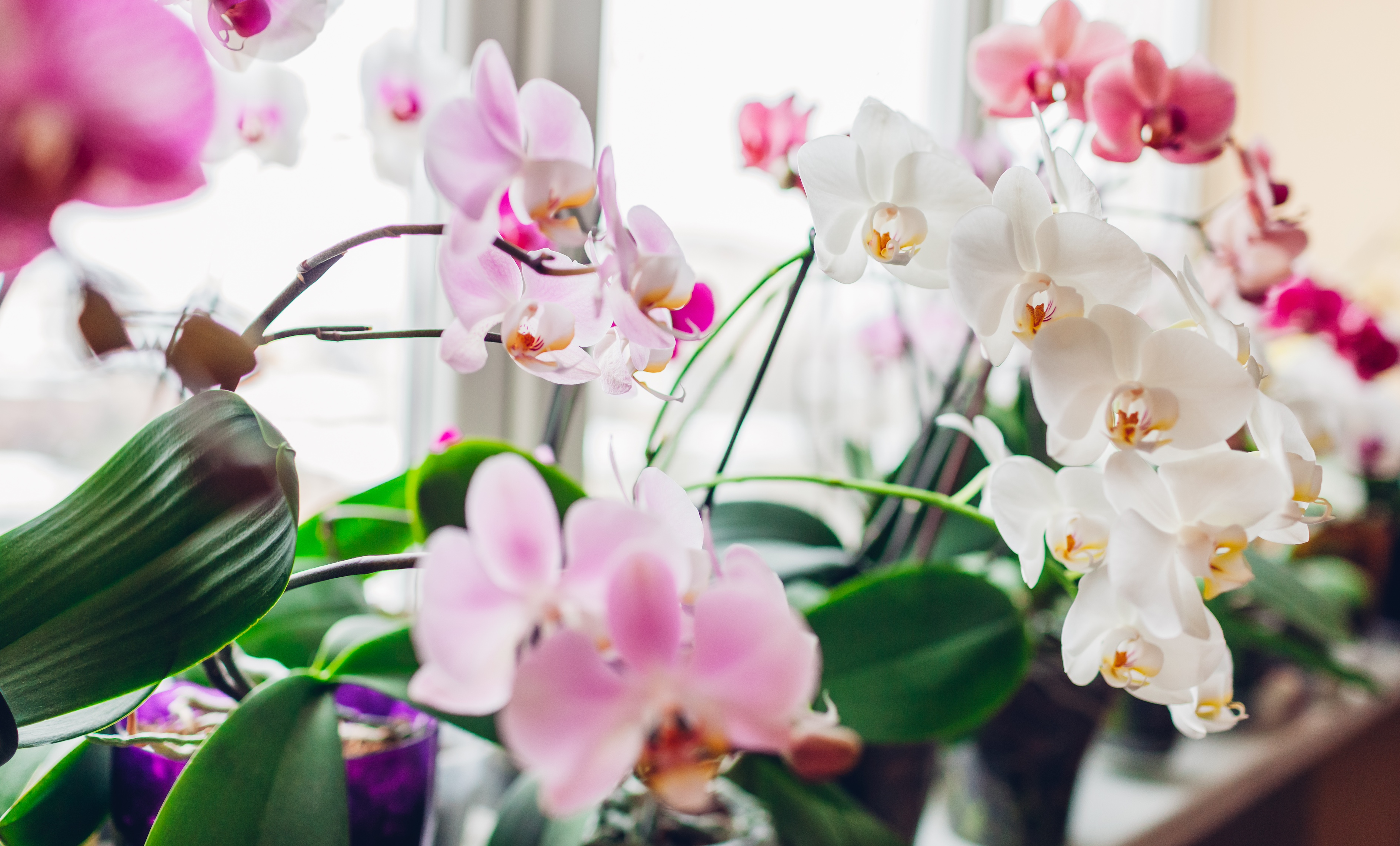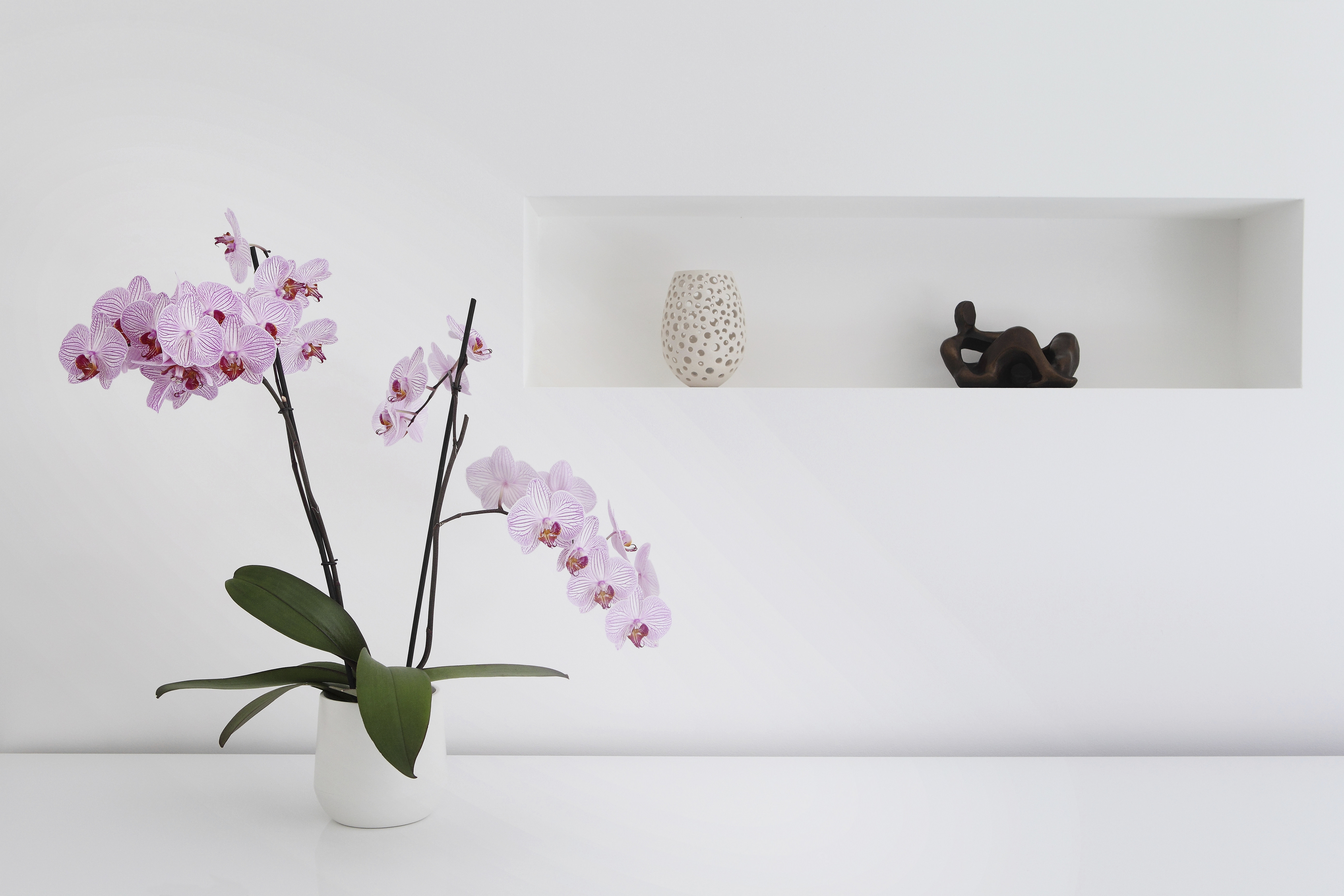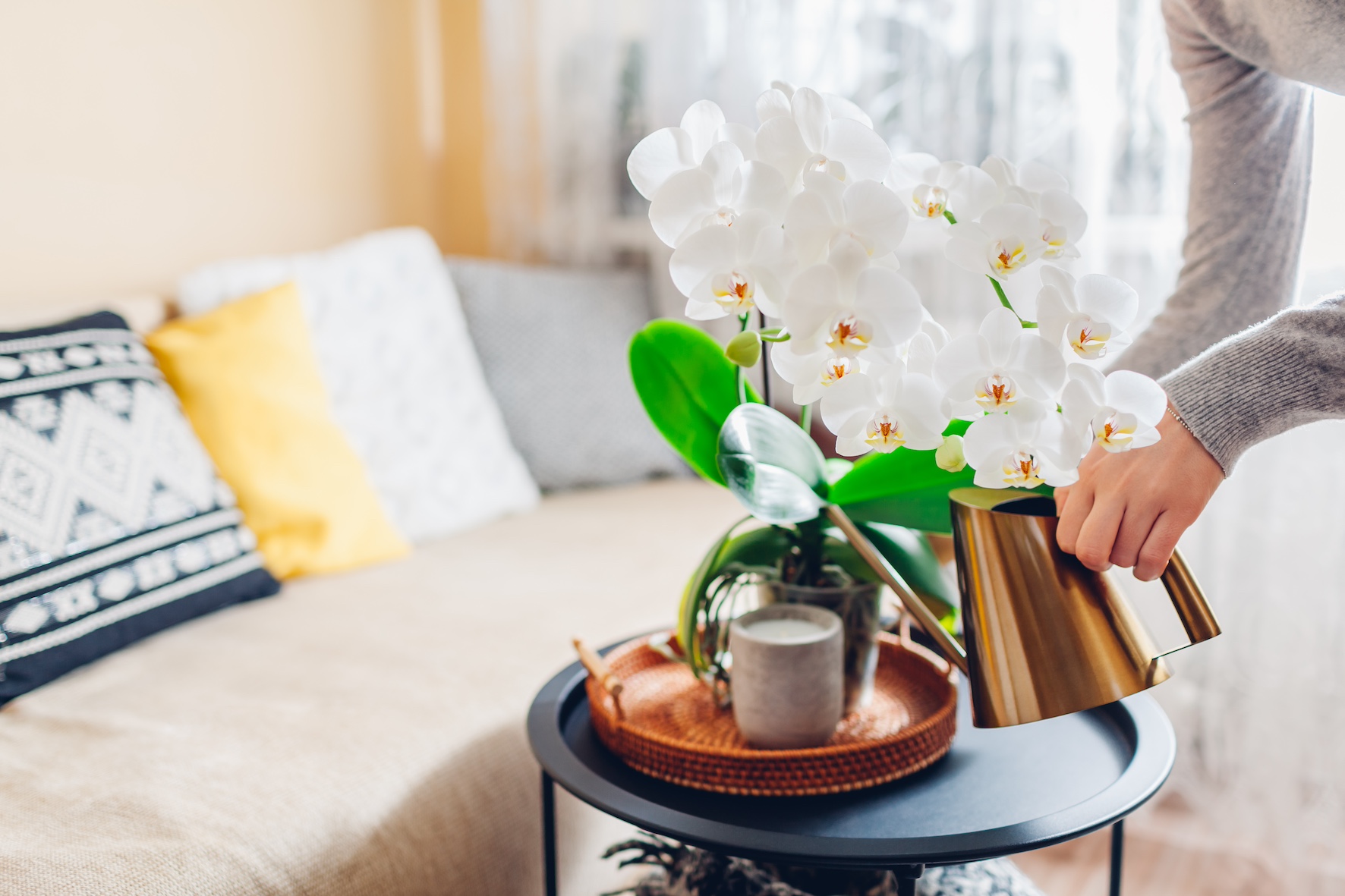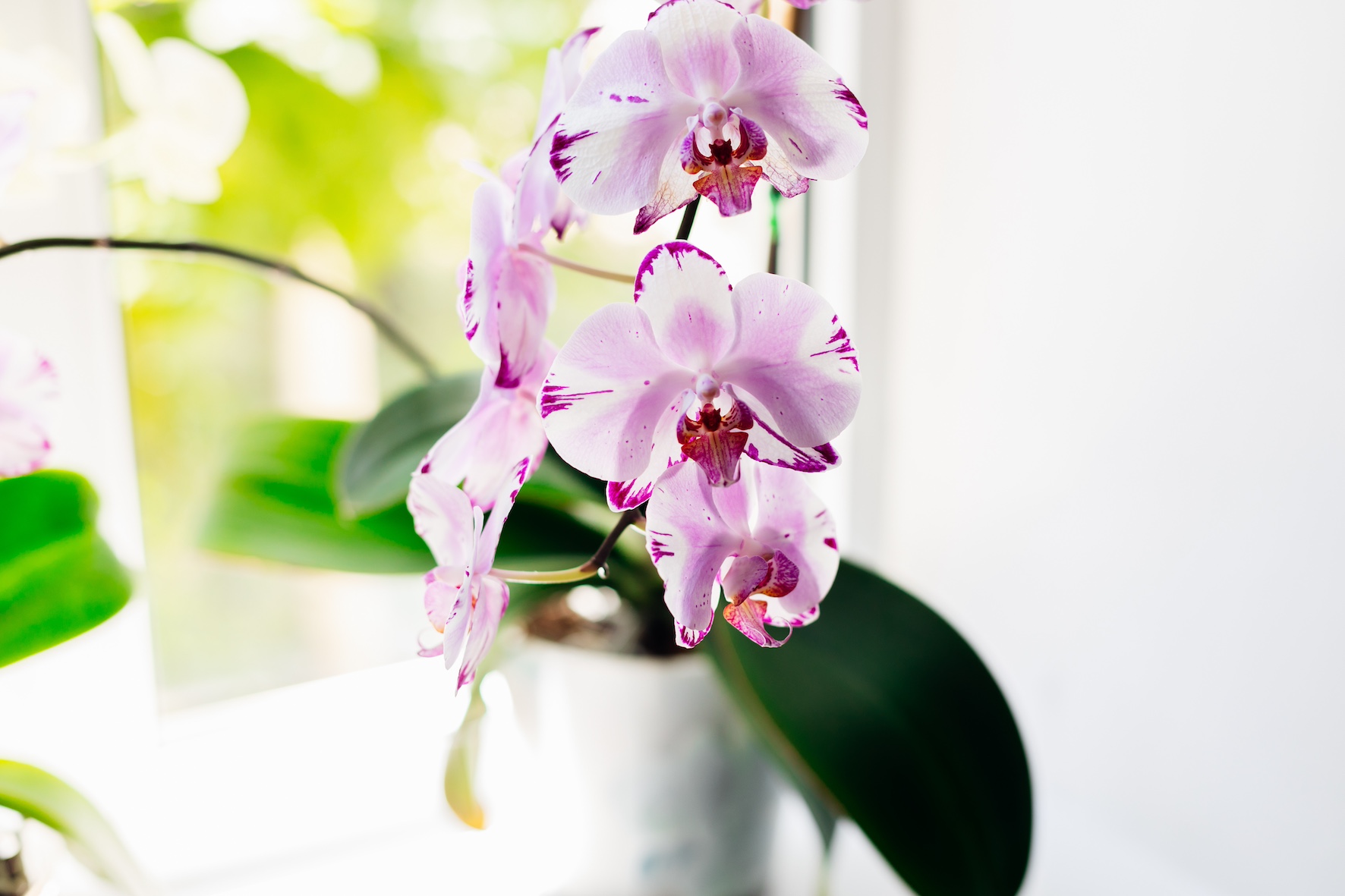
Mastering how to water orchids correctly can extend the life of these delicate plants. There must be few among us who haven't inadvertently killed a once beautiful orchid with a haphazard watering practice.
Even those who know how to care for orchids are not immune. For this tropical beauty hasn't earned its 'high maintenance' tag for nothing. Plucked from its hot, humid origins in the wild, it's no wonder orchids can struggle in our dry, temperate homes. Even orchids that are bred in a lab will hanker after the conditions they originally evolved in.
This is why our watering techniques can make a difference as to whether these pretty plants survive and thrive, or droop and die. Discover expert advice on how to raise your watering game for healthier orchids, with longer-lasting blooms.
How to Water Orchids Correctly

If you're hoping to get orchids to rebloom, you may need to adjust its watering schedule. There are various ways to water plants, such as with a watering can, bottom watering in a saucer, or submerging them. Phalaenopsis orchids generally prefer the latter.
"The ideal way to water a Phalaenopsis orchid is by allowing the soil to dry out completely between waterings before thoroughly soaking it again a week or so later," says Paris Lalicata, plant expert, The Sill.
However, the expert notes that the frequency of how often to water your orchid is dependent on the conditions provided. That includes lighting, temperature, and humidity. Paris adds: "There isn’t a strict calendar schedule to stick to, and the watering frequency may change based on the time of year, such as whether it's summer or winter. You’ll find you may water more in the summer months if lighting and temperatures are higher, and you may water less in winter due to decreased light levels and cooler temperatures."
So how do you water orchids correctly? "The best way to water a potted orchid really depends on what kind of material it’s been planted in," says Whitney Bromberg Hawkins, founder, Flowerbx. "For orchids potted in sphagnum moss, aim to rehydrate all parts of the plant by placing it in a basin or sink, and gently submerge your potted orchid in room-temperature water around once per week.
"For potted orchids planted in bark, your goal is to saturate the bark pieces to act as water stores. To do so, fill a basin or bowl to the bark line and let your potted orchid sit for ten minutes. You won’t need to water it again until the bark feels dry to the touch."
How Often Should You Water Orchids?

So, how often should you water this houseplant? An advantage of gifting someone a potted orchid (usually a Phalaenopsis), over a bouquet of flowers, is that it lasts longer. Yet many of us still don't expect them to live as long as other houseplants, certainly not long enough to continue flowering. Yet that needn't be the case, with the appropriate care and good watering practices.
"One place people often go wrong with potted flowering plants of any kind is misjudging the amount of water they need — usually leaving them dehydrated by underwatering or with rotting roots when overwatered," says Whitney. "Although orchids are grown in tropical climates, they don’t need constantly damp roots. As a rule, water potted orchids once every seven to ten days, fully rehydrating them every time, and only re-watering when the base feels dry to touch."
Whitney highlights that potted orchids offer structural beauty that’s not easy to find with other flowers and notes that "they are a long-lasting way to add elegance and drama to a space."
Price: $9.59
Size: 1L/34oz
Stylish and chic, this GuardWee small watering can for Walmart is ideal for indoor plants. Its see-though design makes for easy cleaning and watering needs. It's the perfect little companion for those popular houseplants.
Price: $48
Material: Glass
This beautiful bright orange glass watering can, is ideal for your blooming indoor plants. It is also available to purchase in a clear color and comes in one size.
Price: $50
Unique in its own way, this showstopper watering can is the perfect decor piece, as well as your plant's trusted companion. Made out of iron, this piece will also look lush on a mantel or shelf when not in use.
What Time of Day Should You Water an Orchid?

Wondering how to make an orchid grow faster? Well, you should probably have a watering routine.
When watering the garden in the summer, it's best to water plants when it's cool first thing in the morning or close to dusk when the sun's heat is going down. Consider a similar treatment for indoor potted orchids when the weather is hot.
"Usually, it’s ideal to water orchids in the early morning or evening to reduce evaporation from hotter temperatures and the sun in the afternoon," says Paris. "However, it’s certainly safe to water at any time of the day if it's needed, especially if your plant isn’t exposed to direct sunlight."
Maintenance Tips for Healthy Orchids

Known as the best tropical flower to grow indoor, there are a few things you can do to keep your bloom happy and healthy. When soaking the soil or potting medium, avoid getting water on the petals or leaves of your orchid, as this can cause rot and other problems. Orchids also prefer indirect light to full sun, so don't leave your orchid by a sunny south-facing window.
"Although Phalaenopsis orchids will survive in the weakest sunlight, like that found near an east-facing window, they will really do best in the shade," says William Davidson, author, Dr Houseplant. "Ideally, position your plants where they receive no direct light at all. "These orchids also need a cool winter, so keep the temperatures around 45°F (7°C). During the summer, the temperature should not rise above 68°F (20°C)."
Plant expert William notes that most orchids need supplementary feeding during the growing season. "Liquid feed is easiest to apply, but always dilute to half the recommended strength," continues William. "Feed regularly, every two or three weeks in summer, but not at all during the resting phase. (Most orchids have a resting phase). While they are resting, they need little or no water and no feed at all."
FAQs
How often should I water an orchid in bark?
Check the bark to see if it's dry and, if it is, water your orchid. Like watering houseplants in general, it is best to check the potting medium first, rather than watering them on a weekly schedule.
"Generally speaking, check your orchid every 7-10 days, and if the bark is completely dried out it’s best to give it a thorough watering to evenly and thoroughly saturate the soil," says Paris. "I personally water all my orchids by top watering them first, then by letting them sit in the water for about 10-15 minutes. This helps the bark get thoroughly saturated.
You can also look out for physical signs. Paris says that since checking the moisture of bark can be challenging, look out for wrinkles and wilting leaves. "If your orchid is still in a clear plastic pot you can inspect the roots — if the roots are shriveled and a silvery-gray color that also is a sign the orchid is ready for watering," she notes.
Can I water an orchid with an ice cube?
Yes you can, it won't damage the orchid, but it doesn't offer any significant benefits either.
"A watering study was done by the University of Georgia and Ohio State University to compare watering orchids with ice vs traditional watering where they found the results to be the same: both orchids were happy and healthy," explains Paris. "I've also known gardeners who have only watered their orchids with ice for years with no issues. Therefore, your choice on how to water your orchids is a personal preference. Watering your orchid with ice cubes is not only safe but a great way to reduce your chances of overwatering.
If you’re using ice cubes, Paris says 3-4 ice cubes should be enough upon each watering. This is dependant on the size of your flower and its pot.







